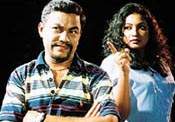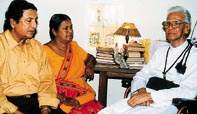| TV
Times
|
||||||
|
'Rajina
Mamai' to be continued on stage In this two
hour programme Latha Walpola sang 30 of her selected songs with
her sons Amith and Suneth. There were other singers such as Sanath
Nandasiri, Victor Ratnayake, Susil Premaratne, Ishak Baig, Rukantha
Gunatilaka, Nuwan Gunawardena, Saman de Silva, Rajiv Sebastian and
Ravindra Randeniya. There will
be a repeated performance of 'Rajina Mamai' at Elphinstone Theatre
on a later date and also at outstations reaching more of her fans. In this musical
extravaganza "Rajina Mamai" at BMICH, she gave the listeners
a variety of her songs composed by the leading musicians of the
day. Latha is credited with over 3000 songs she sang for films and
radio with her husband Dharmadasa Walpola. Both deviated
from the most popular Hindi and Tamil film music and song. They
made an effort to create essentially Sinhala music using haunting
melodies. The words and the meaning of these songs became a pathfinder
for other singers to follow. This was by
no means an easy task. Without any formal training their born talents
helped to succeed as the most popular couple who sang duets based
on love, nature and also touching moments in life. Latha with
humility remembers Susil Premaratna who encouraged her to embark
upon a singing career. Fr. Marceline Jayakody, who provided her
with scintilating lyrics. Some of the most popular songs like 'Premaye
Chandraya', 'Honda Hondama Weya' were original Sinhala songs. Her songs:
'Ranwan Dul Karalin', 'Hanika Yaman' were based on Sinhala kavi
and on Vannam. In Prema Tharangaya
and Ahankara Isthri and Mathalan (except one) Sinhala songs were
not copies of Hindi or Tamil songs. It was a difficult task to break away from Indian influence especially when films were done in South Indian film studios. Both Dharmadasa and Latha should be given the credit for their contribution in laying the foundation for Sinhala songs based on our traditions.
Cicil says
the drama is based on the character of Nelson Mandela, the former
President of South Africa. The drama 'Mandela' depicts the life
and times of Mandela Wasantha Moragode plays the main role as Mendela, while Wimalindra Kumari, Wijerathna Warakagoda, Wasantha Wittachchi, Sarath Kothalawela, Athula Pathirana, Nilin Pradeep Uduwila, Sanath Wimalsiri, Shriyani Lunuwila and Ishan Gammudali are among other casts. Sisil
plays 'Hora Police' The cast includes
Gamini Hettiarachchi, Nimanthi Porage, Ravindra Yasas, Wijerathna
Warakagoda, Badra Nandani Gunarathne, Dinudu Ranasinghe, Saman Chandana
and Susil Gunarathne. Set designing and costume designing by Heenatigala Premadasa. Make up artiste is Jayantha Aberathna. Jayanath Warakagoda will provide music.'Hora Police' is presented by Chandana Wellala.
The
fourth death anniversary of this great figure fell on January 15. The late Kalashoori
Fr. Marceline Jayakody was not born with the proverbial A product of
Madampe Vidyalaya and St. Joseph's College, Colombo he passed the
Cambridge senior amidst financial constraints and was ordained as
a priest on December 20, 1927 after following a spiritual stint
at St. Bernard's Seminary. Fr. Jayakody's
long-playing passion for Arts and poetry started as a little child
while flipping through his father's Ayurvedic literature which had
been in poetic rhythm. His childhood passion eventually took him
to such great heights that he brought fame to Sri Lanka by clinching
Asia's Nobel Prize - the prestigious Ramon Magsaysay award in 1983. Fr. Jayakody
who was acclaimed as one of Sri Lanka's finest writers, always infused
our own traditional culture and values into his creations, also
taught at St. Patrick's College, Jaffna, St. Peter's College, Colombo
and completed a stint at his alma mater St. Joseph's College. The fine violinist,
while studying music at the esteemed Shanthi Nikethan in India,
had the rare honour of having India's former Premier, the late Indira
Gandhi as his contemporary. Fr. Marceline
Jayakody, the respected Catholic Priest, poet, lyricist and journalist,
holds the distinguished record of being the first Catholic Priest
to write songs for Sinhala films and penned nearly 800 songs which
became instant hits among the masses. Always decorating his words
in line with indigenous culture and traditional values, Fr. Jayakody
who was fluent in about ten languages authored several books in
Sinhala and English and was awarded the Kalashoori award in 1982. His eternal
romance with the pen won him the coveted Presidential award for
his anthology Muthu in 1979 and seven years later he was accorded
a special award for penning a special song to mark World Food Day. Fr. Marceline Jayakody who became more humble, the more he was showered upon with success is known to have been a key element in getting Ananda Samarakoon's Namo Namo Matha accepted as our national anthem. It is said that the move came after the then Finance Minister J.R. Jayewardene invited Fr. Jayakody to train the special choir to sing the song as Ananda Samarakoon had gone abroad during the first Independence day celebrations in 1949. Fr. Jayakody
is said to have gone to the temple on Poya days with his mother
Josephine Senaratne - a Buddhist, who later became a Catholic. Perhaps
that background had encouraged Fr. Jayakody to build a close rapport
with Buddhism and Buddhist prelates and years later he was popularly
known as "Pansale Piyathuma" or the Father in the temple. In a significant
move, Ven, Ittepane Dhammalankara Thera wrote a book titled "Mal
Pele Upan Pansale Piyathuma" - the first book in the world
written by a Buddhist prelate about a Catholic Priest. Coming back to films, Fr. Jayakody's 'Wesak Kekulu Athu Aga Mal' written for Lester James Peiris' 'Rekhawa' and sung by Indrani Wijebandara was adjudged the best film song in 1957, largely due to soaking it with wondrous words. Veteran songstress
Indrani Wijebandara recalling the glorious past, told the TV Times
that Fr. Jayakody was her first guru who guided her when she sang
her debut song "Lo Pura Rev Naga". 'He is the
one who introduced me and my husband Sisira to sing in Rekhawa.
There was a fine rhythm even when he spoke to people. He is one
of the greatest human beings I have ever met', she said. Among the other
popular songs penned by him were 'Olu Nelum Neriya Rangala', 'Sudu
Sanda Eliye' and several other Christmas songs including 'Seenu
Handin Lowa Pibidenawa' and 'Ronata Wadina Bingu Obai'. History records
Fr. Jayakody as the only Sri Lankan Catholic Priest ever to have
conducted a Holy Christmas Mass at Jesus Christ's birth place, Nativity
Church in Bethlehem in 1961. The President
of the Lankan Poets Association till his demise, he was also the
first to pen the maiden English song My dreams are roses for my
love for a Sinhala film 'Romeo Juliet'. As a journalist,
he was at the helm of the Gnanartha Pradeepaya - the Sinhala version
of The Catholic Messenger - in 1949 and he used his paper for the
benefit of the entire country. Fr. Jayakody
always captured the perfect harmony between man and nature and artistically
conveyed them through his creations. With the passage of time, even
when ill-health was his closest companion, he continued his childhood
passion of writing. The country lost the ardent lover of nature and his motherland on January 15, 1998, when he was 96. Though Fr. Marceline Jayakody is no more, his works, especially his songs would certainly have immunity from death. |
||||||
Copyright © 2001 Wijeya Newspapers
Ltd. All rights reserved. |
 Dramastist
Susil Gunarathne's latest production 'Hora Police' (Thief and Police)
will go on boards on January 28 and 29 at 6.30 p.m. at Elphinstone
Theatre.
Dramastist
Susil Gunarathne's latest production 'Hora Police' (Thief and Police)
will go on boards on January 28 and 29 at 6.30 p.m. at Elphinstone
Theatre.